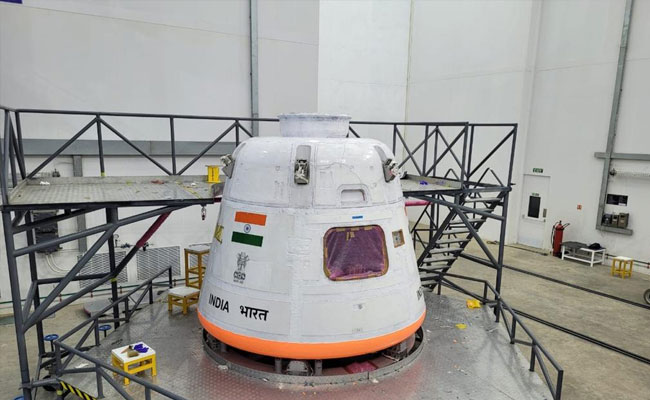Bengaluru (PTI): ISRO on Monday said it would commence unmanned flight tests for the Gaganyaan human spaceflight mission with the launch of a test vehicle between 7 am and 9 am on October 21 from Sriharikota spaceport to demonstrate the performance of the crew escape system.
In a message on social media platform X, the national space agency headquartered here, said, "Mission Gaganyaan: The TV-D1 test flight is scheduled for October 21, 2023 between 7 am and 9 am from SDSC-SHAR, Sriharikota."
ISRO Chairman S Somanath on Saturday told reporters three more test vehicle missions would be launched under the Gaganyaan programme after the TV-D1 test flight on October 21.
The Gaganyaan project envisages a demonstration of ISRO's human spaceflight capability by launching a human crew to an orbit of 400 km and bringing them safely back to earth by landing in Indian sea waters.
The Test Vehicle Development Flight (TV-D1) is aimed at testing the crew module (CM) that will carry Indian astronauts during the human spaceflight late next year.
The TV-D1 test flight involves launching the unmanned crew module to outer space, bringing it back to earth and recovering it after touchdown in the Bay of Bengal.
"The first test vehicle flight (of the Gaganyaan mission) will be conducted on October 21. After that, we have planned for three more test missions, D2, D3, D4. We will hold thorough tests during the test flight sequence," Somanath, who is also the secretary, Department of Space, had told reporters in Rameswaram.
According to ISRO, the test vehicle is a single-stage liquid rocket developed for this abort mission. The payloads consist of the Crew Module (CM) and Crew Escape System (CES) with their fast-acting solid motors, along with CM fairing (CMF) and Interface Adapters.
"The Crew Escape System with Crew Module will be separated from the Test Vehicle at an altitude of about 17 km. Subsequently, the abort sequence will be executed autonomously commencing with the separation of the CES and deployment of the series of parachutes, finally culminating in the safe touchdown of CM in the sea, about 10 km from the coast of Sriharikota," ISRO said.
The crew module is where the astronauts will be contained in a pressurised Earth-like atmospheric condition during the Gaganyaan mission. The CM for the Gaganyaan mission is under different stages of development.
For the TV-D1, the CM is an unpressurised version that has completed its integration and testing.
"With its complete set of parachutes, recovery aids actuation systems and pyros (pyrotechnic device used to separate spacecraft from rocket), the avionics systems in CM are in a dual redundant mode configuration for navigation, sequencing, telemetry, instrumentation and power. The CM in this mission is extensively instrumented to capture the flight data for evaluation of the performance of various systems," it said.
The crew module will be recovered after touchdown in the Bay of Bengal, using a dedicated vessel and diving team from the Indian Navy.
Let the Truth be known. If you read VB and like VB, please be a VB Supporter and Help us deliver the Truth to one and all.
Kalaburagi: Four men have been arrested in Kalaburagi on charge of hacking a man with lethal weapons and pelting stones at him under the limits of Station Bazaar Police Station recently.
According to police sources, Anand Jalak Shinde (34), Ashitosh Jalak Shinde (30), Imran Mehboob Sheikh (28) and Sohaib Anwar Qureshi have been arrested. The men are accused of the brutal murder of Syed Mehboob, a resident of Station Bazaar Upper Line Hamalawadi in the city.
An FIR was filed by the Station Bazaar Police Station based on a complaint given by Syed Ismail, father of the deceased Syed Mehboob.
Following quick probe, the police team successfully arrested the suspects within 24 hours. The arrested men were produced in court and have been sent to judicial custody.
The City Police Commissionerate has appreciated in an official release the police team’s quick solving of the murder case and arrest of the four men accused of murdering Syed Mehboob.





